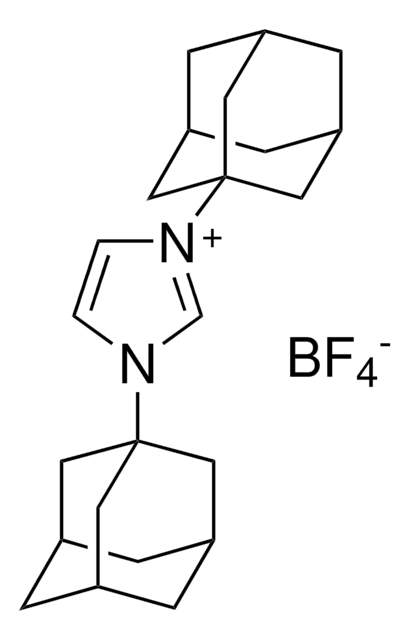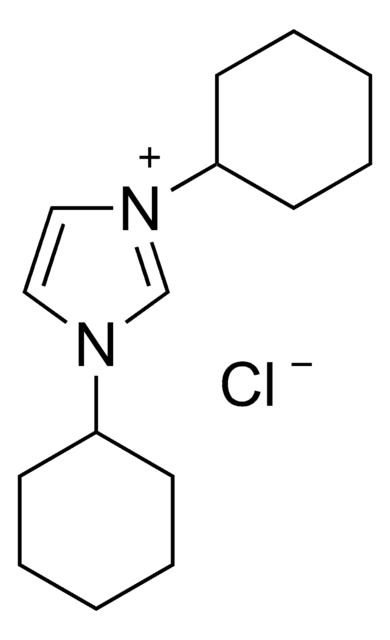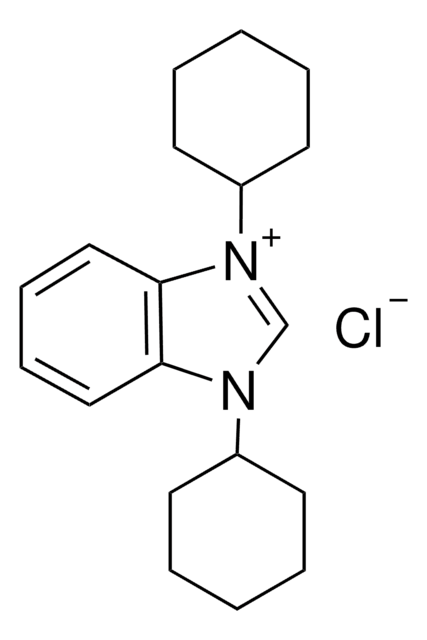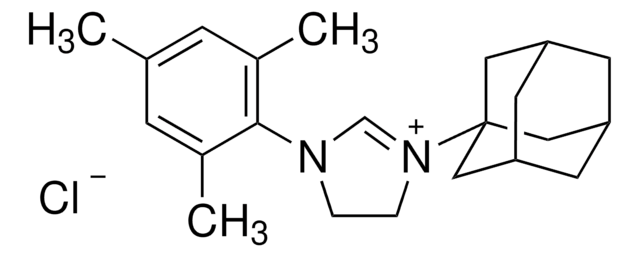656631
1,3-Bis(2,4,6-trimethylphenyl)imidazolinium chloride
95%
Synonym(s):
1,3-Dimesitylimidazolidinium chloride, 4,5-Dihydro-1,3-bis(2,4,6-trimethylphenyl)-1H-imidazolium chloride, 4,5-Dihydro-1,3-dimesityl-1H-imidazolium chloride, N,N′-(2,4,6-Trimethylphenyl)dihydroimidazolium chloride
About This Item
Recommended Products
Assay
95%
reaction suitability
reagent type: ligand
mp
280-286 °C
SMILES string
[Cl-].Cc1cc(C)c(N2CC[N+](=C2)c3c(C)cc(C)cc3C)c(C)c1
InChI
1S/C21H27N2.ClH/c1-14-9-16(3)20(17(4)10-14)22-7-8-23(13-22)21-18(5)11-15(2)12-19(21)6;/h9-13H,7-8H2,1-6H3;1H/q+1;/p-1
InChI key
COGMCBFILULEOS-UHFFFAOYSA-M
Related Categories
General description
Application
Precursor to an N-heterocyclic carbene catalysts used for:
- A regioselective cycloadditon of terminal acetylenes with azides leading to 1,4-disubstitutedtriazoles. Internal acetylenes can also be used with this catalyst.
- Markovnikov-type hydration of terminal alkynes
- Hydrosilylation of ketones and cycloaddition of azides and alkynes
- Suzuki-Miyaura reactions
- Luminescence experiments
Signal Word
Warning
Hazard Statements
Precautionary Statements
Hazard Classifications
Eye Irrit. 2 - Skin Irrit. 2 - STOT SE 3
Target Organs
Respiratory system
Storage Class Code
10 - Combustible liquids
WGK
WGK 3
Flash Point(F)
Not applicable
Flash Point(C)
Not applicable
Personal Protective Equipment
Certificates of Analysis (COA)
Search for Certificates of Analysis (COA) by entering the products Lot/Batch Number. Lot and Batch Numbers can be found on a product’s label following the words ‘Lot’ or ‘Batch’.
Already Own This Product?
Find documentation for the products that you have recently purchased in the Document Library.
Customers Also Viewed
Articles
Metal complex-catalyzed cross-coupling reactions of unactivated substrates introduce diverse phosphine ligands in chemical marketplace.
Metal complex-catalyzed cross-coupling reactions of unactivated substrates introduce diverse phosphine ligands in chemical marketplace.
Metal complex-catalyzed cross-coupling reactions of unactivated substrates introduce diverse phosphine ligands in chemical marketplace.
Metal complex-catalyzed cross-coupling reactions of unactivated substrates introduce diverse phosphine ligands in chemical marketplace.
Our team of scientists has experience in all areas of research including Life Science, Material Science, Chemical Synthesis, Chromatography, Analytical and many others.
Contact Technical Service
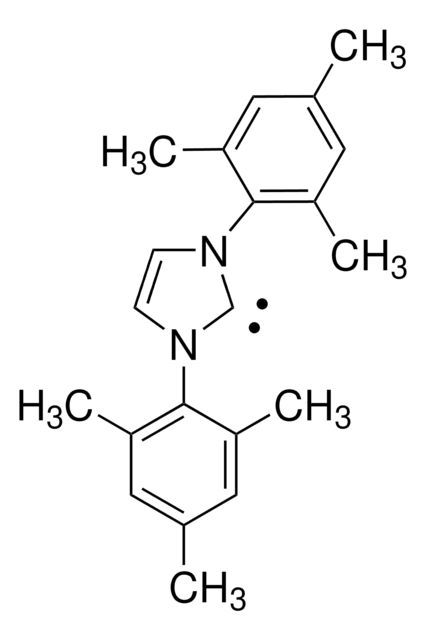


![Chloro[1,3-Bis(2,4,6-trimethylphenyl)imidazol-2-ylidene]copper(I) 95%](/deepweb/assets/sigmaaldrich/product/structures/160/888/97509eeb-0719-4853-aaae-8a9d02f4f7ad/640/97509eeb-0719-4853-aaae-8a9d02f4f7ad.png)
![Chloro[1,3-bis(2,6-diisopropylphenyl)imidazol-2-ylidene]copper(I)](/deepweb/assets/sigmaaldrich/product/structures/199/763/44637b2e-b87c-42a3-abc3-3985b6cd7d5d/640/44637b2e-b87c-42a3-abc3-3985b6cd7d5d.png)


